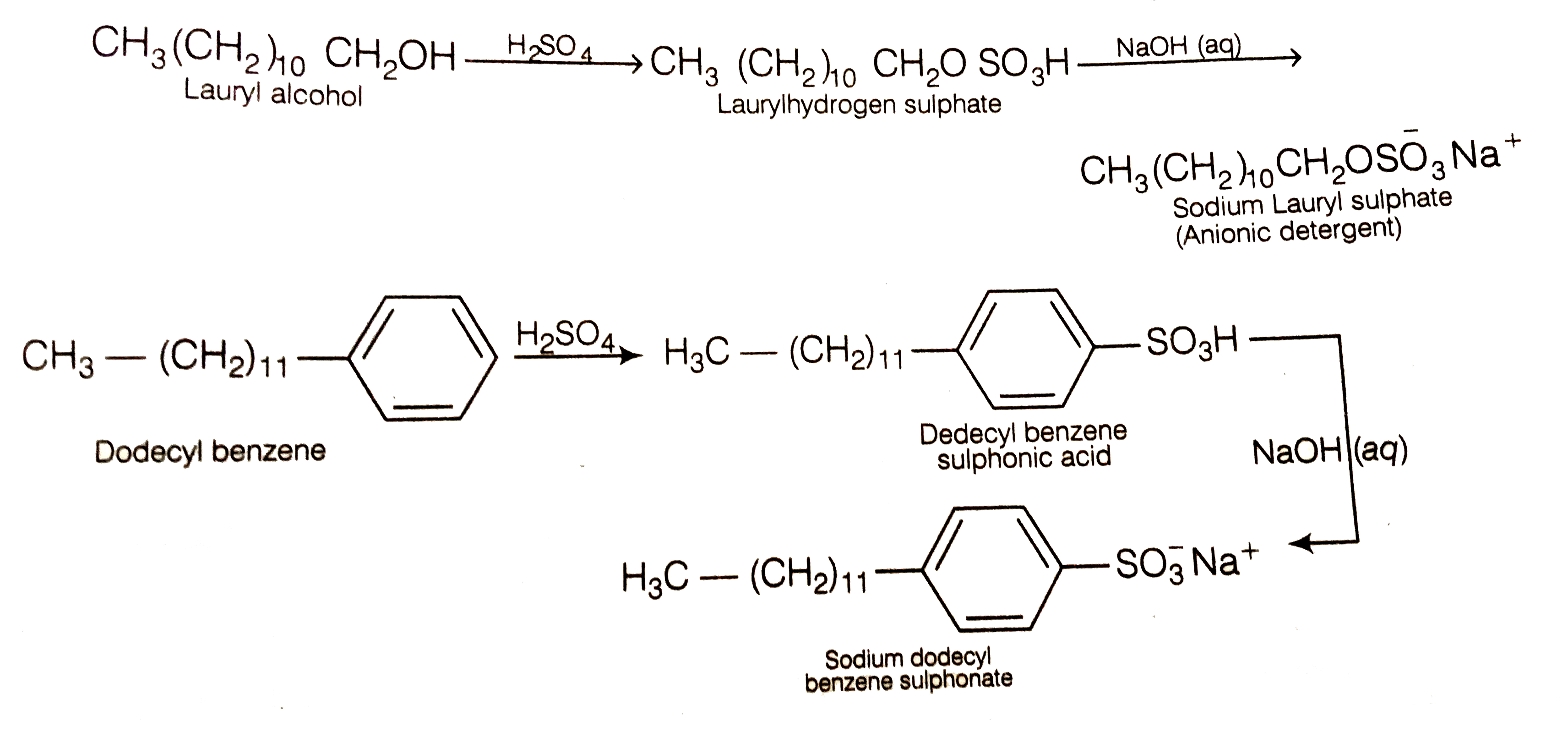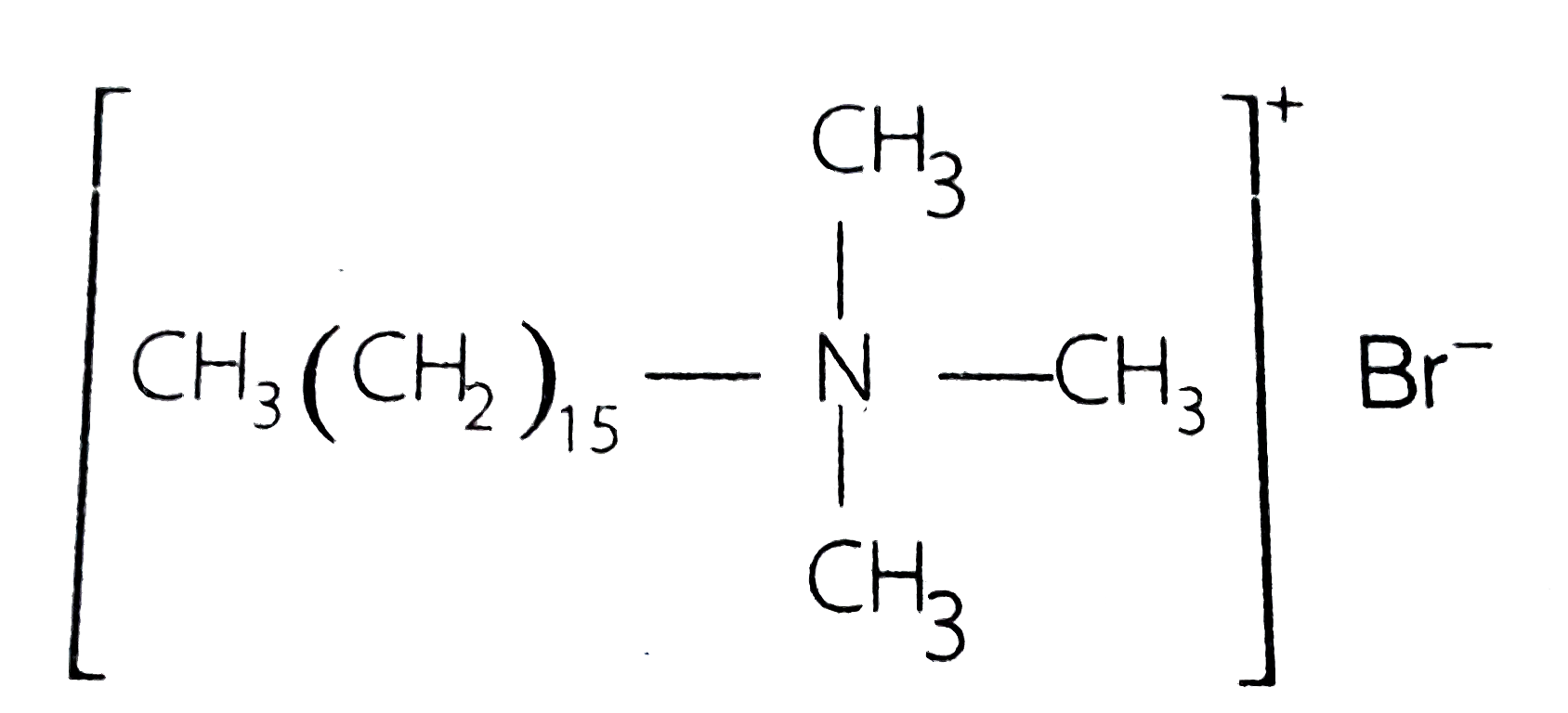Sythetic detergrents have advantage over usual soaps as far as cleansing power is concerned. But use of synthetic detergents over a long time creates enviormental pollution. How can the pollution caused by synthetic detergents be minimised ? Classify the detergents according to their chemical nature.
Synthetic detergents are cleansing agents which have all the properties of soaps, but which easily actually do not contain any soap. These can be used in soft as well as in hard water.
They are mainly classified into the three categories
(1) Anionic Detergents
Anionic detergens are sodium salts of sulphonated long chain alcohols or hydrocarbons. Alkyl hydrogen sulphates formed by treating long chain alcohols with conc. H2SO4 are neutralised with alkali to form anionic detergents detergents. Similarly alklyl benzene sulphonates are obtained by neutralising alkayl benzene sulphoic acids with alkali.

In these detergents, the anionic part of the molecule is involved in the cleansing action.
They are mostly used for house hold work. They are also used in toothpaste.
(2) Cationic Detergents
They are quarternary ammonium salts of amines with acetates, chlorides or bromides as anionss. Cationic part posses a long hydrocarbons chain and a positive charge on nitrogen atom. Cetrimethylammonium bromide is a popular cationic detergent and is used in hair conditions.

Cationic detergents have germicidal propertis and are expensive, therefore these are of limited use.
(3) Non-ionic Detergents
Non-ionic detergents do no contain any ion in their constitution. One such detergent is formed when stearic acid reacts with polyethylene glycol.

Liquid dishwashing detergents are non-ionic type
Advantage of Synthetic Detergents over Soaps
(i) Synthetic detergents can be used in hard water without andy wastage while some of the soaps get wasted.
Synthetic detergents can be used in acidic medium while soaps get precipitated.
(iii) Synethetic detergents are more soluble in wate and hence produce lather more easily than soaps. Some synethic detergents produce lather even in ice cold water.
(iv) Synthetic detergents decrease the surface tension of water to greater extent and hence have a stronger cleansing action than soap.
Synthetic detergents have advantage love usual soaps but use of synetheti detergents over a long time creates enviorments pollution because some detergents have highly branched hydrocarbon chains.
These branches or side chains stop bacteria from attacking and breaking the chains.
This result in slow degradation of detergent molecule leading to their accumulation. Effluents containing these detergents reach the rivers, ponds etc. These persists in water even after sewage treatement and thus water gents polluted.
Since, unbranched (i.e., straight) chains are more prone to attack by bacteria. therefore, in most of the detergents used these days, the branching is kept to a minimum, so that the detergents used these branching is kept to a minimum, so that the detergents become easily biodegradable and hence pollution is prevented.
Topper's Solved these Questions
Similar Questions
Knowledge Check
- Question 1 - Select One
Soaps are the detergents used since long. Soaps used for cleansing purpose are sodium or potassium salts of long chain fatty acids such as stearic acid, palmitic acid. These cannot be used with hard water. Synthetic detergents are cleansing agents which have all the properties of soap but which actually do not contain any soap. These can be used both in soft water and hard water as they give foam even in hard water.
Which is not true for a detergent molecule ?AIt has a non polar organic part and a polar groupBIt has a surface active reagentCIt is a sodium salt of a fatty acidDIt is not easily biodegraded - Question 2 - Select One
Soaps are the detergents used since long. Soaps used for cleansing purpose are sodium or potassium salts of long chain fatty acids such as stearic acid, palmitic acid. These cannot be used with hard water. Synthetic detergents are cleansing agents which have all the properties of soap but which actually do not contain any soap. These can be used both in soft water and hard water as they give foam even in hard water.
Which of the following is called invert soap?ASodium stearateBCetyl trimethyl ammonium bromideCSodium lauryl sulphateDTetraethyl ammonium chloride
Why synthetic detergents are preferred over soaps for use in washing machines ?
View SolutionGive reasons for the following observations :
Use of synthetic detergents causes pollution of water.View SolutionGive reasons for the observations:
Use of synthetic detergents causes pollution of water.View SolutionIf water contains dissolved calcium hydrogencarbonate, which out of soap and detergent, will you prefer to use ? Why ?
View SolutionIn order to wash clothes with water containing dissolved calcium hydrogencarbonate, which cleaning agent would you prefer and why: soaps or synthetic detergents ? Give one advantage of soaps over synthetic detergents.
View SolutionA group of students accompanied by their science teacher went trekking. After reaching the top of the hill they felt hungry. The Teacher told them that they would have to bear the hunger as cooking of food is slow and takes a longer time at the top of the hill. The students wanted to known the reason for the above fact. The Teacher explained the reason for the above fact till the food was cooked. Can you predict the explanation given by the teacher?
View Solution

